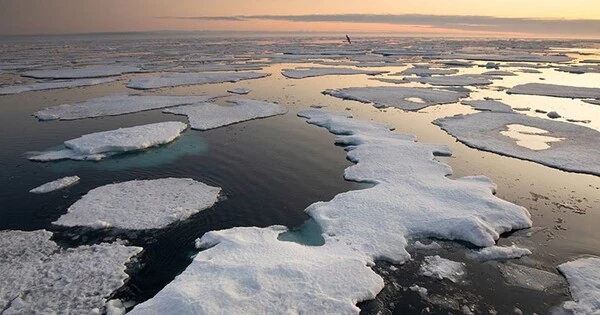Recent scientific studies suggest that the Earth’s oceans are approaching a tipping point, where the effects of climate change on the oceans could become self-perpetuating and irreversible. The tipping point is the threshold beyond which a system undergoes a rapid and potentially irreversible change, such as a sudden shift in the state of the oceans, which could have severe consequences for the planet’s climate.
According to one study, intense global warming could reduce the ocean’s ability to absorb carbon dioxide, resulting in accelerated global warming as the greenhouse gas accumulates in the atmosphere. The decline is caused by a surface layer of low-alkalinity water that forms during extreme warming, impeding the oceans’ ability to absorb CO2. The study is based on a climate simulation that was set up to simulate a worst-case emission scenario, which the researchers say must be avoided at all costs.
By absorbing carbon dioxide emissions, the oceans help to limit global warming. But scientists have discovered that intense warming in the future could lessen that ability, leading to even more severe warming.
The discovery comes from a study led by The University of Texas at Austin in which researchers examined a climate simulation configured to a worst-case emissions scenario and discovered that the oceans’ ability to absorb carbon dioxide (CO2) would peak by 2100, becoming only half as efficient by 2300.
We need to think about these worst-case scenarios to understand how our CO2 emissions might affect the oceans not just this century, but next century and the century after that.
Megumi Chikamoto
The decline is caused by the formation of a surface layer of low-alkalinity water, which reduces the ability of the oceans to absorb CO2. Alkalinity is a chemical property that influences the amount of CO2 that can dissolve in seawater.
Although the emissions scenario used in the study is unlikely because of global efforts to limit greenhouse gas emissions, the findings reveal a previously unknown tipping point that if activated would release an important brake on global warming, the authors said.
“We need to think about these worst-case scenarios to understand how our CO2 emissions might affect the oceans not just this century, but next century and the century after that,” said Megumi Chikamoto, a research fellow at the University of Texas Institute for Geophysics who led the research.
The study was published in the journal Geophysical Research Letters.

Today, the oceans soak up about a third of the CO2 emissions generated by humans. Climate simulations had previously shown that the oceans slow their absorption of CO2 over time, but none had considered alkalinity as explanation. To reach their conclusion, the researchers recalculated pieces of a 450-year simulation until they hit on alkalinity as a key cause of the slowing.
The effect, according to the findings, begins with extreme climate change, which increases rainfall and slows ocean currents. This covers the ocean’s surface in a warm layer of fresh water that won’t mix easily with the cooler, more alkaline waters beneath it. As this surface layer becomes more CO2-saturated, its alkalinity decreases, as does its ability to absorb CO2. The end result is a surface layer that acts as a CO2 absorption barrier. This means that less greenhouse gas enters the ocean and more remains in the atmosphere. This causes faster warming, which helps to maintain and strengthen the low-alkalinity surface layer.
The discovery, according to co-author Pedro DiNezio, an affiliate researcher at the University of Texas Institute for Geophysics and associate professor at the University of Colorado, is a powerful reminder that the world needs to reduce CO2 emissions to avoid crossing this and other tipping points.
“Whether it’s this or the ice sheets collapsing, there’s potentially a series of linked crises lurking in our future that we must avoid at all costs,” he said. The next step, he says, is to determine whether the alkalinity mechanism is activated under lower-emission scenarios.
The findings of the study, according to coauthor Nikki Lovenduski, a professor at the University of Colorado who contributed to the Intergovernmental Panel on Climate Change 2021 climate report, will help scientists make better projections about future climate change.
“This paper demonstrates that the climate change problem may be exacerbated by previously unknown factors,” she said. “However, the ocean climate feedback mechanism revealed in this study will open up new research avenues that will help us better understand the carbon cycle, past climate change, and possibly come up with solutions for future problems.”
















